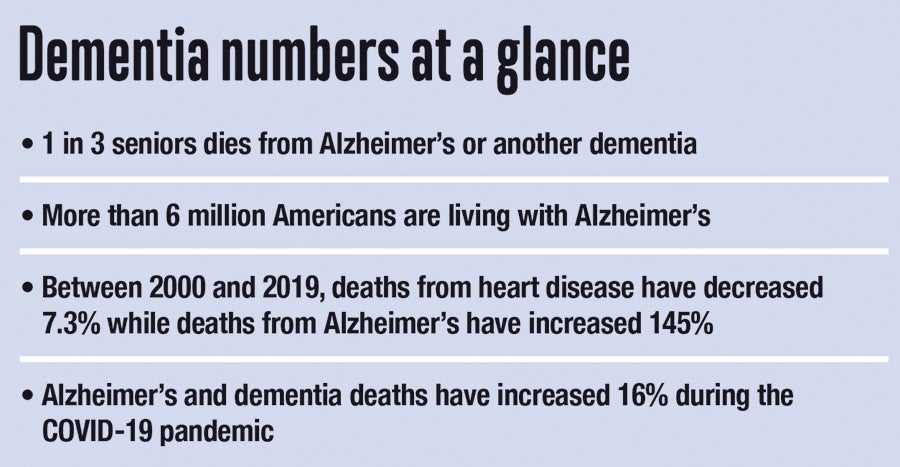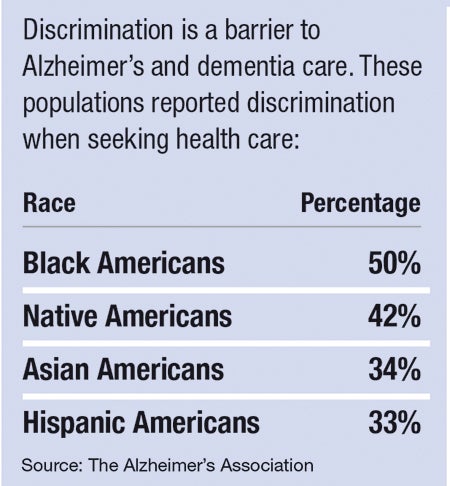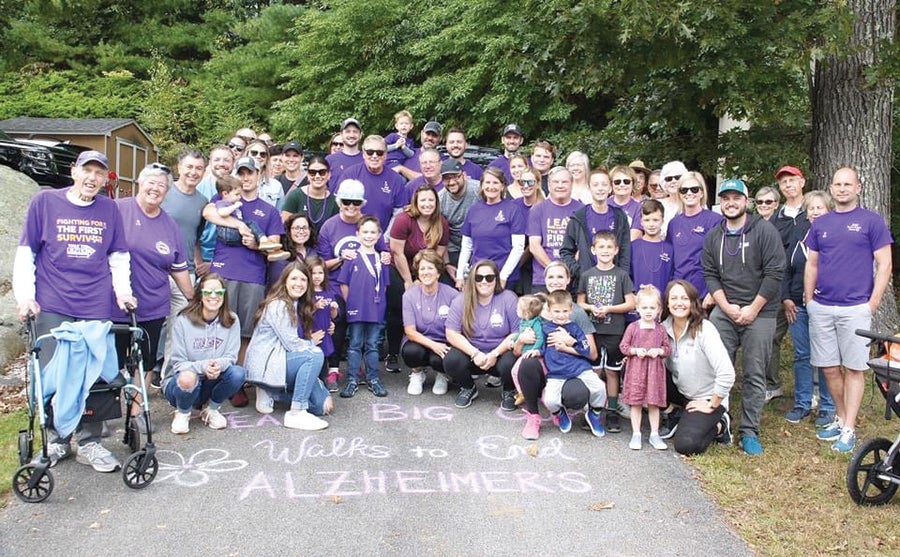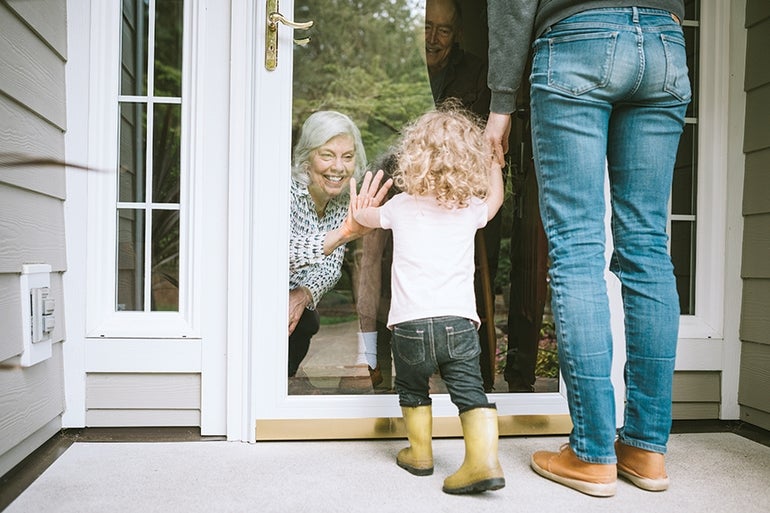Gloria Cosquete began taking care of her mother long before she exhibited any signs of dementia.
“We are Portuguese,” she shared. “So, in a way, my sisters and I have always watched over her because of the language barrier.”
When Cosquete first recognized the decline in her mother’s memory, she faced significant hurdles obtaining a diagnosis. “I can’t translate clinical words in Portuguese, so in hindsight, important details were certainly lost,” she explained, adding, “Alzheimer’s is an awful, awful disease. My mom was a very strong, independent woman immigrating to this country and taking great care of her family by finding excellent jobs that always supported us. And now, to see her basically turning into a child, to see her become a shadow of the woman she was—it’s very sad.”
Soon, Cosquete’s mother moved into her Milford home and enrolled in a nearby adult daycare. “My husband would make sure she got on the bus in the morning when I went into the office—we had a great routine,” she recalled. “But, the adult daycare shut down when the pandemic hit.” Working from home made it impossible for Cosquete to provide the full-time care her mother needed.
“I got her into an assisted living facility and she was there for about a year, not even,” Cosquete said. “She got more aggressive in the beginning because it was a whole new change of scenery.” Once again, the language barrier proved challenging for Cosquete and her family. “There were no Portuguese speaking staff, so they would call me if my mom was acting out, and I would have to go down there and try to calm her down.”
The calls became more frequent as time went on. “They had her admitted for a psych evaluation, which landed her at Baystate Medical Center in Palmer, Massachusetts,” said Cosquete. “She was there for five weeks so they could regulate her meds. The only difficult part was we couldn’t see her at all because of COVID.”
Cosquete and her sisters scheduled regular video conferences with their mother and tried to reassure her everything would be okay. “She had her good days and she had her bad days, but that whole period was really, really hard on us all,” said Cosquete.
When it came time to discharge Cosquete’s mother, the family faced yet another obstacle. “We couldn’t find a skilled nursing facility to admit her to,” explained Cosquete. “All the ones here in Milford would not accept her because she had an aggression history, even though she was finally on the right medications. They have an extended wait period to make sure the patient doesn’t continue to lash out.” Eventually, she turned to the Alzheimer’s Association for guidance and was able to locate a skilled nursing facility 40 minutes from her home.
“We got my mom a bed at St. Mary’s Health Center in December,” reported Cosquete. “It’s going well; the Director of Nursing in the Memory Care Unit is excellent—she’s very empathetic.” Best of all, Cosquete and her sisters can visit their mother as frequently as they’d like. “We wear masks along with the staff,” said Cosquete, “but, obviously my mom doesn’t know what’s going on. She doesn’t understand COVID.”

Inside memory care at The Overlook
The Overlook in Charlton provides a continuum of care for adults with an emphasis on respect and grace. Memory care services at The Overlook include 14 private suites in addition to a day program designed to enhance social interaction and independence for dementia patients.
The pandemic had an immediate impact on many of the Overlook’s enrichment activities but Program Director Kathleen Walker was determined that the show must go on.

“We were accustomed to having entertainers come in once or twice a week because music is such a popular activity for people with dementia,” Walker said. “We got creative in order to maintain a very important piece of joy for them. Entertainers came outside our unit to a back hallway where we have a lot of windows; they set up out there and our residents sat inside by the windows as their audience.”
Under Walker’s leadership, the staff stepped up, filling in for absentee art teachers and yoga instructors. “We had to close down all visiting for a period of time, so the staff became like a family to our residents,” Walker said.
Dementia patients at The Overlook were given mask assessments, rendering them exempt from covering their faces. Staff remained masked and tried to maintain social distance, an admittedly difficult feat in the field of memory care. As visiting became permissible, guests wore masks in resident’s rooms, but continued to abstain from participating in programming and activities.
“Enrollment numbers shot up when the day program resumed,” shared Walker. “I think people realized just how much their loved ones were in need of socialization and things to do. I think that the caregivers also realized how exhausting it is to try and be the person providing everything 24 hours a day, 7 days a week, 365 days a year. Not to mention, being stagnant and isolated can make the disease progress even quicker.”
The toll of isolation
Arlene Liscinsky noticed the little things first.
“He’d misplace his phone at home, he’d forget his keys, or he’d lose his sense of direction,” she shared of her late husband, Joe’s, plight with Alzheimer’s. He made the 62 mile commute from Connecticut to New York City everyday for years, but as his dementia set in, the car accidents became frequent and retirement became inevitable.
“I went from leading a very active lifestyle to feeling like I had an infant,” explained Liscinsky. She dressed, fed, and changed her husband each day. By the time COVID hit, she was used to a relatively isolated existence.

“I had to be especially careful not to contract COVID because I became his full time caretaker,” said Liscinsky. “God-forbid I went down.” She thinks back on this time as one of pain, sorrow, and suffering for her family. “Even though we had him at home, physically there with us, he wasn’t there mentally,” she recalled.
Joe passed away on January 24, 2021, following a fall that left him bed ridden with a broken arm. To avoid making her loved ones choose between compromising their own safety and paying their respects to her husband, she forewent a traditional funeral.
The pandemic made an already atrocious battle with Alzheimer’s even more burdensome for Liscinsky and her family, but it was over. In October, her daughter hosted a Walk to End Alzheimer’s followed by an open-air Celebration of Life at Purgatory Brewery in Whitinsville.
“We finally had some closure,” Liscinsky said.
If you or a loved one are struggling with dementia, you don’t have to go it alone. The Massachusetts Chapter of the Alzheimer’s Association is dedicated to providing quality support for patients and caregivers alike. Learn more at www.alz.org.
CORRECTION: A previous version of this article incorrectly stated that Joe Liscinsky commuted from Uxbridge to Boston when in fact he lived in Connecticut at the time.

